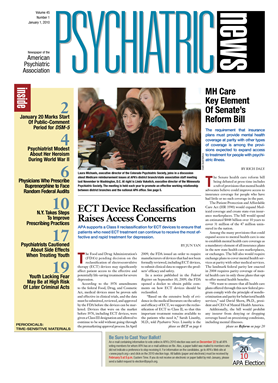We have recently announced a new timetable for DSM-5 (see DSM-5 Postponed Until 2013; Field Trials Scheduled for Summer). As you may remember, a few months ago we asked Dr. Carolyn Robinowitz, a past APA president, to chair the Board of Trustees DSM-5 Oversight Work Group. The work group has spent considerable time reviewing the status of the work in preparation for the new manual with the chair and vice chair of the DSM-5 Task Force, as well as with the task force and work group members. After much consideration, the task force recommended that the Board extend the timeline for development of DSM-5 and aim for its release in spring 2013 instead of 2012.
A number of issues entered into the decision. For one, there are a number of details that need to be addressed regarding the specifics of the proposed classification system, including an assessment of consistency of definitions and application of symptom dimensions. The new dimensions under consideration need to be tested in field trials that will likely take more time than initially planned. Also, we were aware that work on DSM-5 began more slowly than anticipated. One step that led to the delay was the vetting of the task force participants; it took considerably longer than expected, pushing back the start date for the overall process and obviously shortening the time for promulgation and testing in anticipation of the 2012 release date.
The draft guidelines for diagnostic criteria will be posted on the Web in the near future with a comment period of two to three months. The field trials will commence in July. Altogether it makes much more sense to lengthen the schedule to allow for sufficient discussion by task force members, as well as by investigators, clinicians, and the public. Also, the new schedule provides sufficient time for further revisions based on the results of the field trials.
Finally, the extension will permit better linking of DSM-5 to the U.S. implementation of the ICD-10-CM codes for all Medicare/Medicaid claims reporting, which are scheduled to go into effect on October 1, 2013. APA will also continue to work with the World Health Organization (WHO) to harmonize DSM-5 with the mental and behavioral disorders section of ICD-11, which WHO plans to release no sooner than 2014.
As DSM gets ready for initial comments and then field trials, I have been discussing with Dr. Darrel Regier, vice chair of the DSM Task Force, the possibility of members' playing a greater role in the collection of data that could guide future classifications as well as practice.
APA's Practice Research Network (PRN) has been in place for a number of years, and it will be involved in conducting some of the DSM-5 field trials. (The PRN is a nationwide network of psychiatrists who cooperate to collect data and conduct research studies on a variety of clinical and service-delivery issues.) Once the PRN and other DSM-5 field trials are completed and the revision is published, PRN participants could be used to identify diagnostic groups of interest and participate in genetic studies to further test the validity of these newly defined diagnostic phenotypes.
It seems to me that the members and APA need to think about going an extra mile in shaping the field and ultimately helping to improve our specialty more directly. Can we move the profession up a notch to an even more evidenced-based specialty? If you have thoughts, send me a brief e-mail at
[email protected].
I'd like to remind you that information about DSM-5 can be found online at <www.dsm5.org>, where you can submit your suggestions and comments to APA after the comment period is announced. Look for that information in a future issue of Psychiatric News.
We are planning informative and interactive sessions on
DSM-5 at APA's annual meeting next May. Interactive audience-response technology will be used for some of the sessions as we have been doing for FOCUS Live sessions. These should prove both informative and fun. We are looking for feedback from APA members regarding various innovations. So mark your calendars to be in New Orleans for the meeting from May 22 to 26. I look forward to seeing you all there.


